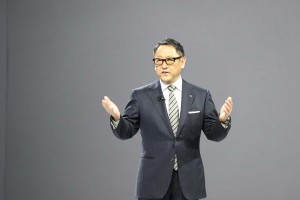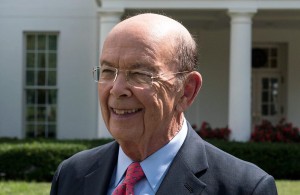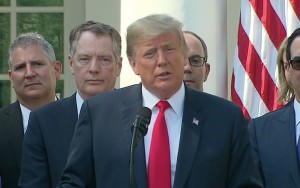
Toyota CEO Akio Toyoda called the prospect of his company being called a "national security threat" by the Trump administration "sad."
Toyota plans to boost by $3 billion its investment in the U.S. market, a decision that comes as the automaker – and other foreign-based brands – are facing the possibility of huge new tariffs from an American president who has labeled them a “national security threat.”
That designation is something that “makes feel sad,” Akio Toyoda, the Japanese giant’s CEO, said during an appearance at the Economic Club of Washington. “I hope that this kind of conversation can go away,” the grandson of Toyota’s founder said through an interpreter.
Separately, the head of Toyota’s North American operations cautioned that those planned investments, which include $749 million to upgrade existing plants in five states, could be cut back if the Trump administration moves ahead with tariffs, something experts have warned could actually result in lower U.S. car sales and a sharp loss of automotive jobs.
The U.S. Commerce Dept. last month completed a study under Section 232 of the Trade Expansion Act that would allow the president to place tariffs of up to 25% on foreign-made autos and car parts if imported goods were deemed a threat to national security. The White House has not yet commented on the study’s findings, though Pres. Donald Trump has hinted at where his heart lies, in early February referring to himself as a “tariff man.”
(Commerce Dept report could trigger tariffs. Click Here for the story.)

Commerce Secretary Wilbur Ross led the study determining if automotive imports could be declared a threat to national security.
He has expressed repeatedly his belief that such threats will help bring back American manufacturing, but there is little evidence that his numerous trade actions have yielded much of a payoff to date, and Toyota officials have downplayed the role such threats played in laying out the company’s expanded U.S. investment program.
“These investments are not being driven by trade,” said Toyota’s North American CEO Jim Lentz, but rather by the need to adapt to rapidly changing U.S. market conditions that have seen a surge in demand for crossover and sport-utility vehicles.
All told, the carmaker now plans to invest $13 billion in the U.S. from 2017 through 2022, up from a previous target of $10 billion.
Among the steps announced on Thursday, Toyota will add production of the RAV4 Hybrid and Lexus ES 300h hybrid at its big Georgetown, Kentucky assembly line.
(Click Here to see the Trump administration walk back its tariff claims.)
“All this economic activity, I hope, shows that we’re a plus factor to the economic security of the United States,” said Chris Reynolds, an executive with Toyota’s North American manufacturing operations.
That said, another top executive raised concerns that tariffs and trade disputes could backfire. Toyota has already estimated that the cost of the average midsize Camry sedan could jump by $1,600, even though it is assembled at the Georgetown plant, due to tariffs on some of its components.
“I think it makes it difficult,” said Lentz, “because it’s going to impact the overall industry.” Lentz said he hoped the administration would “make the right move” after looking at “the impact on reduced sales and reduced production and reduced employment” the threatened tariffs would have.
(China suspends punitive tariffs during trade negotiations. Click Here for the story.)
During his speech at the capital’s Economic Club, Toyoda tried to soften such concerns and play up Toyota’s role as a good corporate citizen of the U.S. “Regardless of the direction we go, we will never leave the United States,” he said. “We will stay here.”


A basis for any government of any country imposing tariffs is a source of revenue to function as a government. When any country tries to impose tariffs to control the economy, that economy is doomed.